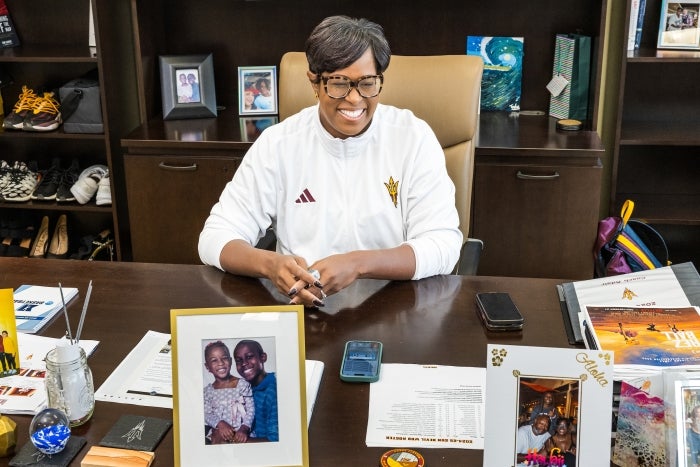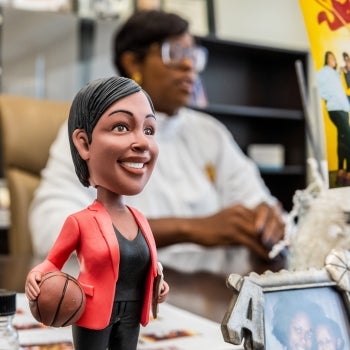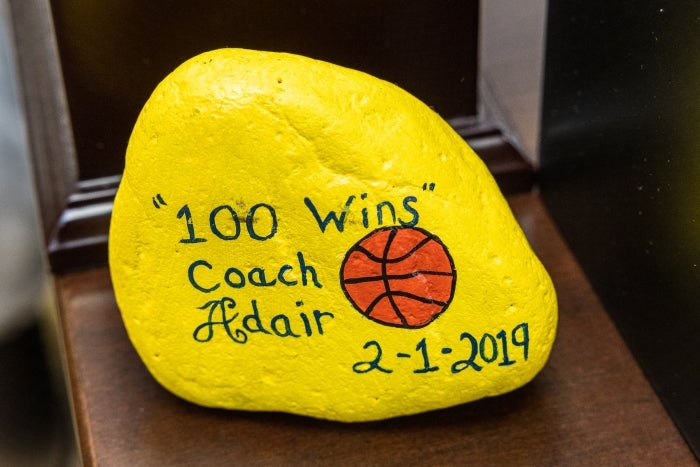Equal parts grit and grace: Coach Natasha Adair’s approach to the game

Natasha Adair (shown outside the ASU Weatherup Center on Oct. 17) was named the ASU women's basketball coach in March 2022. A torn ACL in high school, rather than forcing her to leave basketball behind, just made her more determined to succeed. And succeed she did. Photo by Deanna Dent/ASU
Editor’s note: This story is featured in the 2024 year in review.
When Natasha Adair drove to the basket for a layup one October night in 1990, her future was right in front of her.
Adair, a senior at Albert Einstein High School in Kensington, Maryland, was a preseason basketball All-American and being recruited by more than 200 college coaches, including Connecticut’s Geno Auriemma.
A new season begins
The ASU women's basketball team's season begins Monday, Nov. 4, with a home game against Jacksonville State University at 6:30 p.m.
Find the full season schedule and buy tickets on the Sun Devils Athletics site.
But as she landed on the court at Wilson High School during a preseason game and heard the pop in her knee, everything changed.
Her plans. Her basketball career. Life, really.
“I couldn’t get up,” Adair said. “I mean, I screamed. People still talk about the scream.”
Adair feared she had torn her anterior cruciate ligament, a fear that was realized when she woke up in a hospital bed following her surgery. In the ensuing days, her mother, Evelyn Barnes, tried to console her. She told Natasha that God has a plan for her.
Natasha was 17. She didn’t see a plan. All she felt was pain, physically and emotionally.
“It was a dark time for me, just trying to navigate what was next,” Adair said. “I was like, ‘Mom, what is the plan? Because this was it.’”
Adair didn’t know it then — couldn’t have known it — but the injury headed her down a path that, 32 years later, would lead her to become the women’s basketball coach at Arizona State University.
“People often ask me if I would change what happened,” said Adair, who was named the Sun Devils’ coach in March 2022. “No. It made me who I am.”
*
It’s not hyperbole to say this is a new era for ASU women’s basketball.
First, the geographical reach of the Big 12 — the conference stretches from Florida to Arizona — means more eyeballs and attention on the Sun Devils.
“We’re playing in a Power Five conference where you get national exposure,” Adair said. “Now, we’re in every household versus limited households before. We can go now to Orlando and recruit that student-athlete where we might not have before, just because their families wouldn’t have seen her (play in college).
“Now, we can go there or the Midwest and say, ‘Hey, we’re going to bring your daughter home at least once and you’ll get to see her.’ That helps us from a recruiting standpoint.”
Second, ASU will play a handful of games this season in Mullett Arena, and Adair believes the 5,000-seat capacity will provide a loud and boisterous home-court advantage.
“There’s no bad seat in Mullett,” Adair said. “The fans are going to feel like they’re right on top of you. The energy is going to be rocking. It’s going to be electric.”
Finally, women’s basketball has never been more popular. Thanks in part to Caitlin Clark — the University of Iowa sensation who was the first overall pick of the 2024 WNBA draft by the Indiana Fever and went on to be named Rookie of the Year — the WNBA this past season set records for TV ratings (a 170% increase from the 2023–24 season), attendance and merchandise sales.
“The game has exploded,” Adair said. “You go home, watch ESPN and a game is on. You turn on other networks, and you’re watching women’s basketball. … And I think we’re just scratching the surface. There’s interest, and there’s buy-in.”
Adair’s interest in the game started early. She was a dual-sport athlete growing up in Maryland — she ran the 100 meters, 200 meters and competed in the triple jump — and on afternoons, early evenings and weekends she could be found playing pickup basketball with men at Pomander Court, situated just a few feet from the family home.
“That’s where my toughness grew,” Adair said. “I got my shot blocked. I got knocked down. But I’m telling you, when I scored I talked a whole lot of trash.”
Adair played on the same team as her father, Bobby Barnes — “my dad could shoot,” Adair said — but her natural proclivity for the game came from her mother, who played basketball in high school and for two years in college.
“The natural genes did that,” Evelyn said.
By the time she was 17 years old, Adair stood 6 feet 1. That was a bonus on the basketball court, but it led to ribbing from others. She was called “Too Tall T” and had to wear men’s tennis shoes because there weren’t any women’s sneakers her size.
Enhanced game-day experience
From infrastructure upgrades at Desert Financial Arena to new, customized menu options, Sun Devil Athletics is excited to give basketball fans an enhanced experience this season. Read more on ASU News.
“She was very self-conscious about that,” said Adair’s sister, L’Tonya Davis. “Anytime you are different, or you stand out from the other boys or girls, people have something to say.”
Fortunately for Adair, she had a strong support system. Her mother, Adair said, is a prayer warrior and the heart of the family. Her father is the edge, the fighter. To this day, Adair talks to her two siblings, L’Tonya and Darryl Barnes, via Facetime every morning.
By the time she reached Einstein High School, Adair didn’t stand out only because of her size. She had a quality, a genuineness that attracted others to her.
“She was a people person from the beginning,” said Patti Ripley, Adair’s coach at Einstein. “She had a smile that could light up the room, and she was just so personable for one that young. With her teammates, other coaches, officials. There was no BS with her, even then. She’s just a very, very special human being.”
Adair missed all of her senior season with the knee injury, but the disappointment only grew her resolve. Rather than move on and put basketball in her rearview mirror, she doubled down. On the advice of University of South Florida coach Trudi Lacey, Adair enrolled at Pensacola Junior College, rehabilitated her injury and led the team to two state championships. She then played at South Florida, where she still holds the school’s single-season rebounding record.
Adair’s maturity and people skills quickly became evident at South Florida, where she was named team captain and earned the nickname “Grandmama.”
“She arrived on campus and all of those attributes … her personality, her leadership style, her ability to reason and critically think and solve problems, were evident,” Lacey said. “Her teammates saw that in her. She is by far one of my most famous athletes I’ve ever coached.”
There was no WNBA in 1994, so Adair took her communications degree and became an assistant athletic director at South Florida with a focus on marketing and fundraising.
Basketball was over for her — at least until, on a trip home in 1998, she went to an AAU (Amateur Athletic Union) game to watch her cousin play and ran into Georgetown women’s coach Patrick Knapp, who had recruited her.
Knapp asked if Adair could swing by his office later that week. Sure, she said. They met, Knapp offered her an assistant coaching job and, Adair said, “here I am, 27 years later.”
Through all of her coaching stops — including head coaching stints at College of Charleston, Georgetown, Delaware and Arizona State — Adair has remembered something a former coach once told her: The living trophies, the lives of the young women she’s leading, are as important as the trophy awarded for the national championship.
It's why Adair considers coaching to be not just a job but a calling.
“I’m not in this just for the coaching part of it,” she said. “It’s a holistic approach. When we sell ASU women’s basketball, we sell every aspect. I don’t make a lot of promises to the parents and the families, but I do promise that (my players) will graduate and they’ll be proud of who they are as people.
“We can’t just feed the basketball and not feed the soul. I think, for me, that’s how it’s always been.”
Guard Tyi Skinner, who followed Adair from Delaware to ASU, said Adair often tells her players it’s about withdrawals and deposits.
“She talks a lot about just who we are as people and that this is bigger than basketball,” Skinner said. “It’s more so life and what are you depositing into your life?
“Are you just always taking, taking, taking, asking, ‘Why don’t we have this, or can we get that?’ Or are you just being a good person and grateful for what you have? She wants us to be respectful, upstanding people. I think she just is trying to prepare us to be adults rather than just basketball players.”
In 2020, Adair joined the founding group for Black Coaches United in 2020. The organization’s mission is to foster more diverse, equitable and inclusive environments in college basketball.
“The world had kind of shut down because of COVID, but we didn’t want to stop teaching. We didn’t want to stop being impactful,” Adair said. “For us, it was an opportunity to target grassroots coaches, to teach them about the game and provide resources for coaches when they don’t know who to go to or have a direct path.”
It’s why Adair encourages her players to speak out about societal issues, heeding the words of one of her mentors, former Georgetown coaching legend John Thompson.
“I think what he taught me was impact,” Adair said. “When you see something, say something. When you have a voice, use it. When you have a platform, don’t let it go unnoticed.”
In so many ways, there’s a through line between Adair’s upbringing and what is now her ASU family.
“I coach from a place of love,” said Adair, who has two children, Aaron, 27, and Alyssa, 19. “When you come to our program, you’re going to be a part of a family, and you’re going to feel loved, you’re going to feel valued, and you’re going to feel support and appreciation.
“That love came from my mom. But there’s a fight in me like no other. That’s my dad.”
And all these years later, that 17-year-old young woman who screamed when her knee gave way knows one simple truth about herself.
“There’s nothing I can’t do,” Adair said. “Nothing.”
More Sun Devil community

ASU president connects with veterans during town hall
Arizona State University President Michael Crow shared his family’s military background, provided university updates and reaffirmed ASU’s commitment to military-affiliated students during a town hall…

Tested tips for taking exams
With May quickly approaching, many students are starting to prep for their most important tests of the year — final exams.Toni Miceli, the inaugural director of the bar exam success program at…

School of Transborder Studies celebrates 15th anniversary
During the summer before his freshman year at Arizona State University, Salvador Macias participated in the AGUILA Youth Leadership Institute, a college access organization designed to help young…




